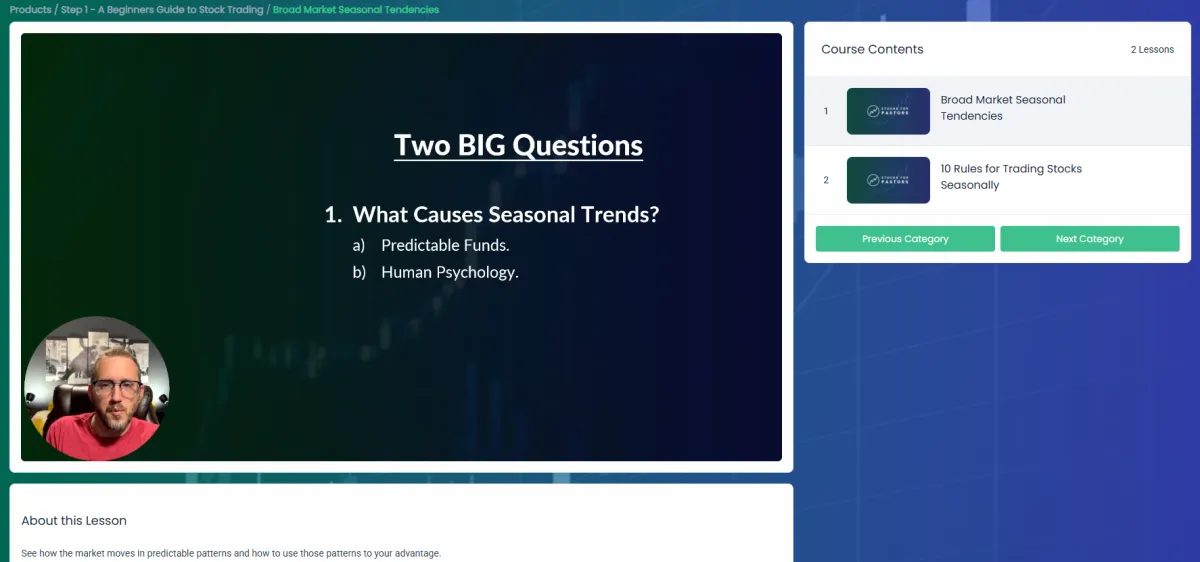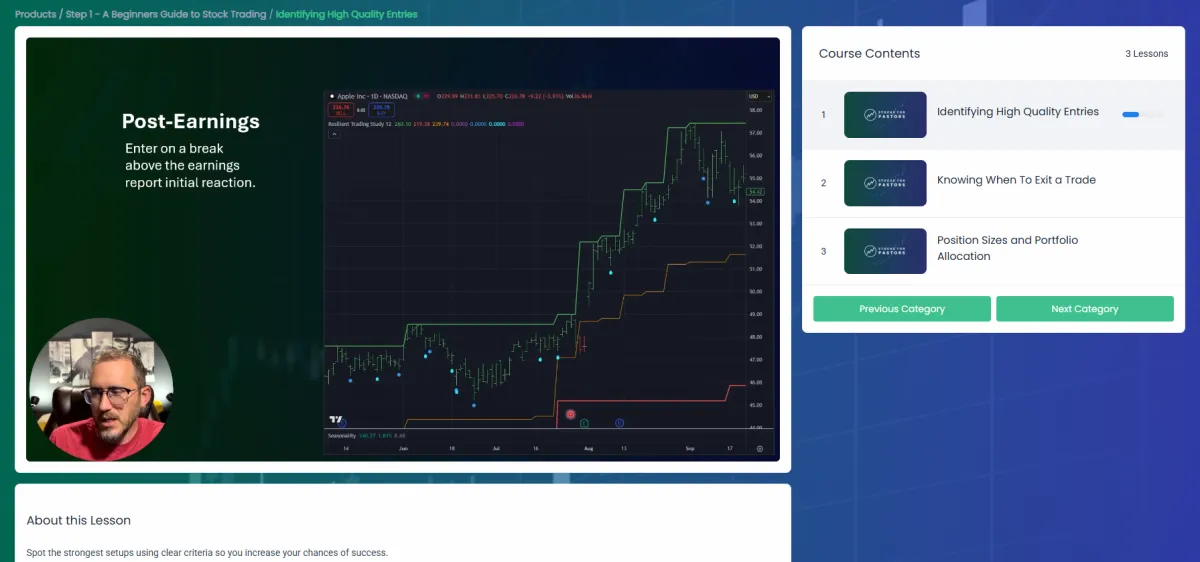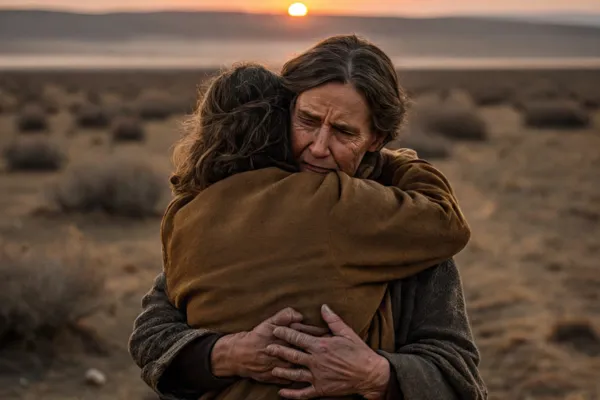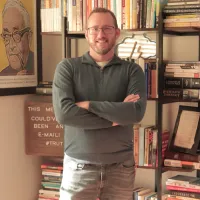Start Investing with Confidence, Even If You’re Brand New
This free bootcamp is your first step toward confident investing. In just a few short lessons, you’ll learn a simple system you can actually use.


Most church leaders feel overwhelmed by money and unsure where to even start.

This bootcamp gives beginners a safe, step-by-step way to invest without jargon or complexity.

Imagine the peace of finally knowing how to grow your savings with confidence and consistency.

What You’ll Learn
How stocks actually work and why you don’t need Wall Street experience to invest.
How to open your first brokerage account with step-by-step instructions.
What seasonal investing is and why it gives beginners a unique edge.
A simple trading system that helps you decide when to buy and sell.
First steps for new investors so you can start with confidence, not confusion.
Why Seasonal Investing Works
Seasonal investing is built on predictable, recurring patterns in the market. Think of it like planting in the right season: some months are better for certain stocks than others. By learning these patterns, you can make informed trades that reduce guesswork and increase confidence.

This training walks you through the process step by step, so you can take advantage of these patterns without spending hours in front of charts.

This Bootcamp was built for busy leaders who don’t want another endless online course. It’s short, focused, and designed to get you moving right away.
Who This Is For?
The First-Time Investor
You’ve never bought a stock in your life, and you want someone to walk you through the basics without making you feel dumb.The Frustrated Dabbler
You’ve bought stocks here and there, maybe even followed tips or trends, but you’ve never seen consistent results. You’re ready for a proven system that actually works over time.The Overwhelmed Saver
You’ve tried saving, but it feels slow and discouraging. You want a way to actually grow your money instead of watching it sit there.The Busy Leader
You don’t have hours each week to watch charts or read financial reports. You need a simple plan that fits into your real schedule.
I've been a pastor for over 25 years and an investing coach for more than 15. My mission is to help leaders like you build financial resilience so you can focus on your calling.
"I don’t believe in get-rich-quick schemes. This course teaches the same steady approach I’ve used for years to help leaders grow their savings without stress."
This is the system you’ll learn in the Bootcamp. I've been trading it personally for years and have teaching it to leaders like you since 2018.

Average 2–3% ROI per month for the past 7 years

Turned $1,000 into $5,000 in 2 years using this exact system

Repeatable trades built on seasonal patterns with a high win rate
Here’s what other leaders who started right where you are Have to Say about their experience with Stocks for Pastors.

“I never thought investing was something I could do, but this gave me confidence, clarity, and a clear path forward.”
Joel S.

“My account has nearly doubled in 18 months since I started with Stocks for Pastors.”
Eric B.

“Michael’s course has helped me see a clear path to advance my family financially. It is doable and attainable- exactly like he said it would be."
Dave C.
Everything You Need, Right Here
This Bootcamp is not a teaser or a sales pitch. It’s a complete, beginner-friendly system you can use to start investing with confidence. You don’t need to buy anything else to make this work.
In just a few short trainings, you’ll know how to open your account, spot seasonal opportunities, and place your first trade with a proven process.
No fluff. No missing pieces. Just a clear path you can follow starting today.
Read Our Latest Blogs
Lorem ipsum dolor sit amet, consectetur adipiscing elit.

Ruth’s Compassionate Leadership: A Model of Sacrificial Presence
The book of Ruth, just four short chapters, has become a blanket of comfort to me in recent years. Ruth was strong and steady, yes, but what strikes me most is how intentionally she chose to be present with Naomi from the very start.
In Ruth 1:1–18, we’re dropped straight into heartbreak. There’s no warm-up. The author rips the bandage off and places us in the middle of a grief-stricken conversation. Naomi is unraveling. “The Lord’s hand has turned against me!” she cries in verse 13. She is bitter, spiritually disoriented, and barely holding herself together.
We know Ruth is also recently widowed. Ten years of marriage brought her no children, no future, no security, and now even her relationship with Naomi is under threat. Ruth's own life is in ruins.
And yet, Ruth does something radical. She doesn’t center her own pain. She doesn’t say, “I’ve lost, too,” or “We’re both hurting.” She doesn’t correct, compare, or even commiserate. Instead, she chooses compassion over empathy. That choice changes everything.
Empathy would have said, “Me too.” It would have shifted the spotlight and made room for both women to sit side by side in sorrow, but without direction. That’s what Orpah does. She weeps, kisses Naomi, and turns back. But Ruth steps into something far more costly.
Before she ever speaks, she clings (v. 14). Action precedes words. And when Ruth finally does speak in her famous vow (vv. 16–17), notice what’s missing: there is no mention of her own grief. Every word is about Naomi. “Where you go, I will go… Your people… Your God… Where you die…” Ruth intentionally sets herself aside and aligns her future to Naomi’s pain.
This is not soft-hearted sympathy. It’s sacrificial solidarity.
Compassion costs something. It is not just a feeling; it’s a virtue. Empathy is a capacity, a God-given ability to understand another’s suffering, but compassion is a choice to act for someone’s good, even at great personal cost. Ruth left her homeland, her family, and her future for the unknown, simply to walk beside Naomi.
We live in a world that exalts empathy as a moral good in itself. But empathy, while necessary, is morally neutral. Even the most destructive people can be empathetic when it suits them. Compassion, by contrast, is always aligned with love and justice. It reflects the very character of God (Psalm 145:8), the heart of Christ’s ministry (Mark 6:34; Matthew 14:14), and our calling as believers (Colossians 3:12).
In Ruth 1, we see what this virtue looks like: a woman who chooses presence over performance, sacrifice over self-expression, and movement over mirroring. Ruth doesn’t match Naomi’s grief; she shoulders it. And in doing so, she gives Naomi something to hold onto—hope.
This is the kind of spiritual muscle we’re called to develop. Not to simply sit in puddles of pain with one another, comparing wounds, but to link arms, take each other’s hands, and pull forward. Not everyone will come with us. Ruth didn’t argue with Naomi. She simply resolved to stay. And when Naomi saw that Ruth was determined, “she stopped speaking to her” (v. 18).
Naomi was too numb to appreciate Ruth’s gift. Even after their journey, she returned to Bethlehem saying, “I came back empty,” while Ruth stood beside her, full of loyalty and love. But Ruth stayed. Not because Naomi could give her anything, but because compassion compelled her.
And because of Ruth’s choice in chapter 1, we get the redemptive ending in chapter 4.
For the Pastor’s Wife Who Loves the Naomi in the Pew
Pastor’s wife, you know this story well, not because you’ve studied it, but because you’ve lived it.
You’ve sat beside the Naomi who believes God has abandoned her. You’ve fielded the late-night texts, heard the sharp words born from pain, and stood quietly while someone grieved in a way that made your own loss feel invisible. You’ve carried burdens you didn’t cause and kept showing up when no one thanked you. Like Ruth, you’ve chosen the long road of compassion over the easier road of self-preservation.
Sometimes, you wonder if it’s worth it.
Let Ruth remind you: compassion is not always recognized in the moment, but it is never wasted. The fruit often grows in silence. Naomi couldn’t name Ruth’s love at the gate, but Ruth’s presence was the soil where redemption could take root.
You don’t need to match the grief of those you serve. You don’t need to fix it or carry it perfectly. You only need to stay close enough to walk with them out of it.
That’s your sacred calling: to be a steady, compassionate presence that helps others walk toward healing, even when they can't see it yet.
Keep going. The seeds you're planting today may not bloom until chapter 4, but they will bloom.



